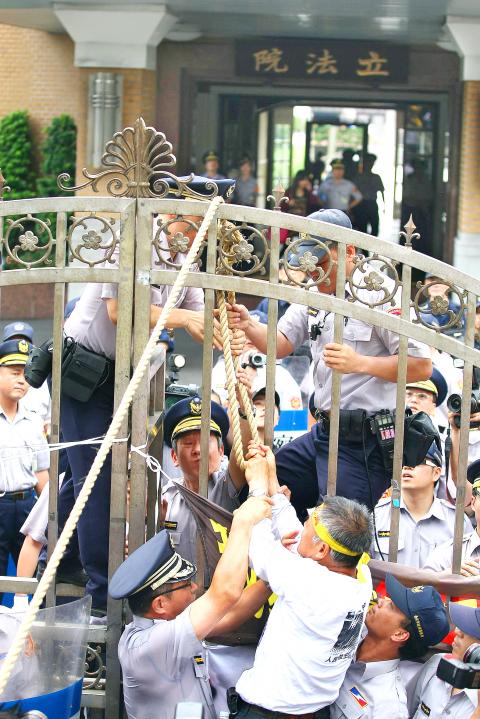|
Anti-nuclear protest demands
referendum on plant’s construction
By Lee I-chia / Staff Reporter

Protesters calling for a
referendum on nuclear power tussle with police in Taipei yesterday as they try
to use a rope to pull down the gate of the Legislative Yuan, after lawmakers on
Monday passed a NT$14 billion budget to continue construction of the Fourth
Nuclear Power Plant.
Photo: CNA
Upset about a NT$14 billion (US$485.5
million) budget to continue construction of the Fourth Nuclear Power Plant in
Gongliao District (貢寮), New Taipei City (新北市), that was passed by the
legislature on Monday, anti--nuclear protesters yesterday rallied in front of
the Legislative Yuan in Taipei to demand a referendum on the matter.
The rally organizer, the Taiwan Environmental Protection Union (TEPU), said the
Fourth Nuclear Power Plant was a patchwork design assembled by Taiwan Power Co (Taipower),
and could threaten the health of people living in Taiwan.
TEPU attempted to submit a petition to the legislature yesterday, asking for the
decision to allow operation of the Fourth Nuclear Power Plant to be decided by
public referendum, “but they won’t let us inside,” TEPU secretary-general Lee
Cho-han (李卓翰) said.
“Protesting against nuclear power isn’t just about saving people in Taiwan, it’s
also about saving the Earth,” Green Party Taiwan spokesperson Pan Han-shen (潘翰聲)
said, adding that “people asked me why we don’t protest against the many nuclear
power plants along China’s coastlines ... but we are not the same nation, so we
can only control what’s happening in Taiwan and monitor our legislators.”
After protesters were blocked from submitting the petition or entering the
Legislature Yuan by shield-wielding police, who lined up behind the closed
gates, the protest organizer, a former TEPU chairman and professor at National
Taiwan University, Kao Cheng-yan (高成炎), tried to climb the front gate of the
legislature, causing a brief scuffle between protesters and police.
Kao said that the public paid for construction of the Legislative Yuan and
lawmakers’ salaries, so they should be allowed to enter the legislature to
submit their petitions instead of being shut out.
|
![]()
![]()
![]()